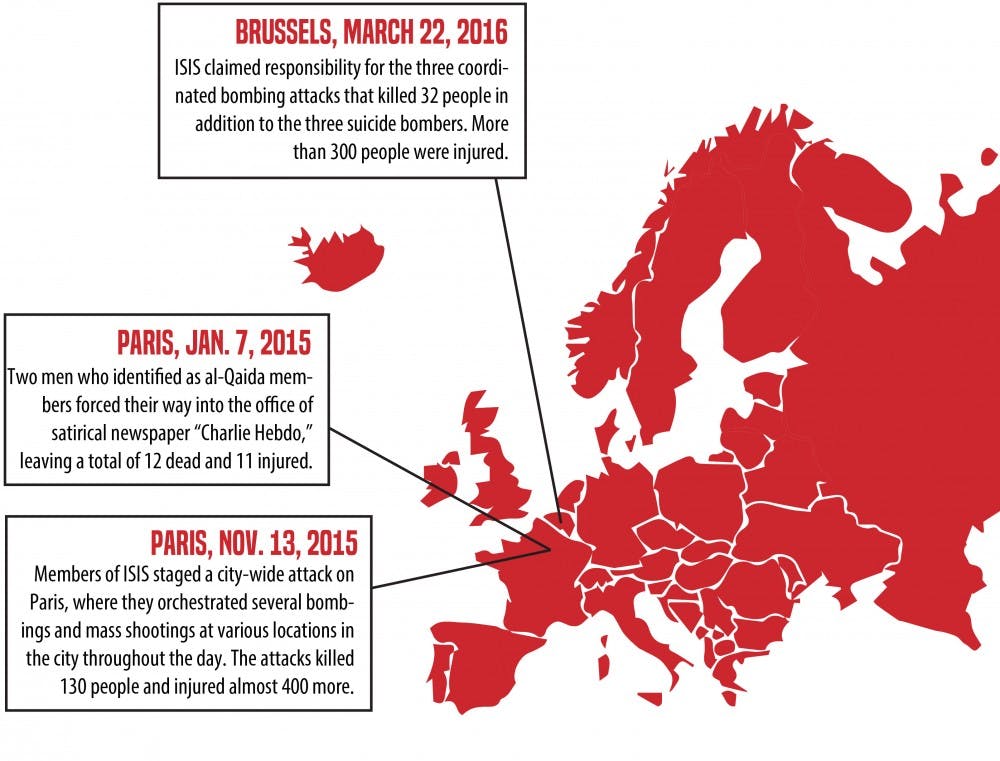U.S. college students are more than twice as likely to die on their own campus than while studying abroad, according to a study conducted by The Forum on Education Abroad. The study reported 13.5 students out of every 100,000 die abroad each year.
But the study also found the number of college students who die each year in the United States is 29.4 out of every 100,000. And while the purpose of the report was to provide “objective information regarding the safety of study abroad,” the recent terrorist attack in Belgium has raised concerns within the Elon community about student safety internationally.
Mykel Dodson ’10 lives in Brussels and was standing about 100 meters from Maelbeek Station — the site where one of the March 22 blasts occurred.
In a video interview published by the university, Dodson described what it was like to be in the middle of an attack.
“As they were ushering people up the stairs and out of the station, it became more real, and once we arrived at the street it was pretty hectic,” Dodson said in the university interview. “We were walked right past Maelbeek Station, and that’s where you saw a lot of things that you kind of wished you didn’t see.”
In an informal online canvassing of 78 Elon students, 20.5 percent said the Paris and Brussels attacks have changed their perspectives on studying abroad. They said they will likely stay home because. of the attacks. More than 19 percent said the lasting fear of those attacks might affect their decision-making process.
But about 56 percent of those surveyed said they were unaffected by the terror attacks and intend to take full advantage of the opportunities offered by Elon’s Global Education Center (GEC).
Richard Landesberg, associate professor of communications and traveling faculty adviser for the 2015 fall program in London, explained how study abroad is an opportunity to confront fears rather than run away from them.
“We want students to study abroad to get them comfortable with things that are different,” Landesberg said. “Not better or worse, just different. Life is enriched when you accept and then learn to appreciate those differences. And if you’re abroad living in fear, you’ve let the terrorists win.”
Landesberg was tasked with calming fearful students after the Nov. 13 Paris attacks. He said his primary concern was for the safety of his students, two of whom were in Paris on the night of the tragedy. He worked to reassure students of their safety through statistics and context.
Woody Pelton, dean of global education and assistant professor, reaffirmed Landesberg’s beliefs.
Pelton noted that the GEC takes precautions when sending students to areas where staff members have reason to believe risk is higher than usual. He said the GEC uses news of current events and recommendations from the U.S. Department of State when making decisions pertaining to student safety on study abroad programs.
Recently, a program in Turkey was cancelled because of increased political strains worsened by the continuing Syrian refugee crisis and because of numerous terrorist attacks in the capital city, Ankara.
Pelton and his team were able to salvage those students’ study abroad experiences, rerouting the trip to several other Mediterranean nations.
Though Pelton recognized some may find heavy precautions unnecessary, he said overprotection can keep students safe.
“A little fear is not a bad thing,” Pelton said. “It makes students cautious and keeps them smart in their decision-making while they are halfway around the world.”


